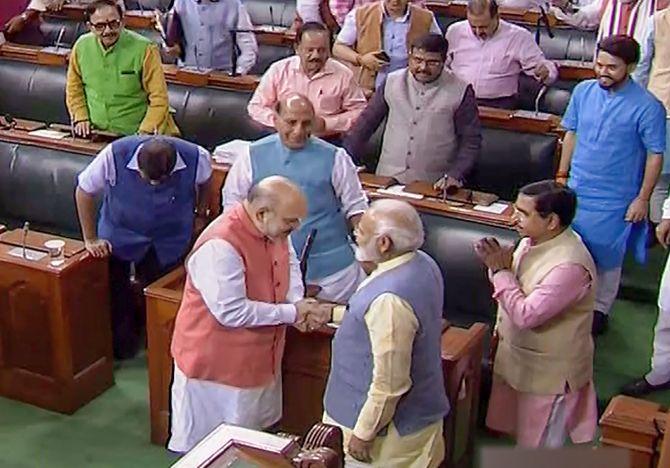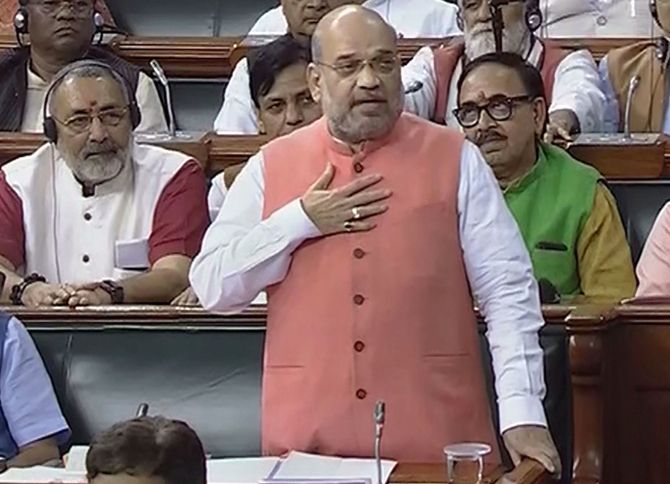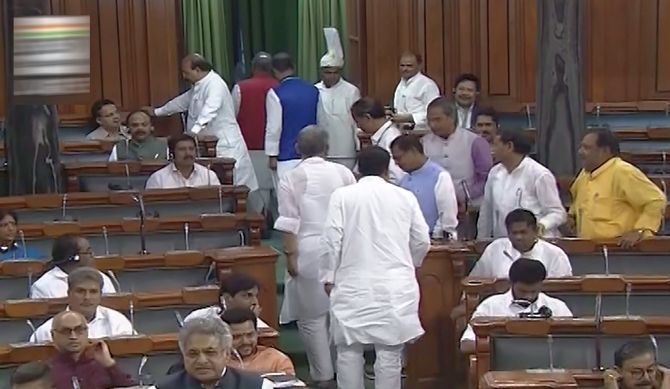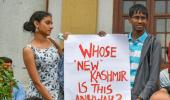Prime Minister Narendra Modi hailed the passage of bills as a "momentous occasion" in parliamentary democracy and said a new dawn awaits the people there as they are now free from the "shackles" of vested interest groups.

Parliament on Tuesday approved a resolution abrogating special status to Jammu and Kashmir under Article 370 of the Constitution and a bill for splitting the state into two Union Territories.
The resolution was adopted by Lok Sabha with 351 members voting in its support and 72 against it, while one member abstained.
The bill to create two UTs -- Jammu and Kashmir, and Ladakh -- was passed by 370 votes in favour and 70 against. Prime Minister Narendra Modi was present in the House when the motion and the bill were cleared.
The resolution and the bill were approved by Rajya Sabha on Monday.
Just before the voting, Samajwadi Party members, excluding Mulayam Singh Yadav, and Nationalist Congress Party members staged a walk out.
The Trinamool Congress had already made it known that it would not participate in the voting and had left the House earlier.
National Democratic Alliance ally, the Janata Dal-United also walked out of the proceedings.
Some Congress members and Assaduddin Owaisi of All India Majlis-e-Ittehadul Muslimeen pressed for division of votes.

Biju Janata Dal, Telangana Rashtra Samithi, Bahujan Samaj Party, YSR Congress and All India Anna Dravida Munnetra Kazhagam voted in favour of the resolution and the bill.
Replying to the debate, Home Minister Amit Shah said that India will continue to claim the territories of Jammu and Kashmir under the occupation of Pakistan and asserted that the United Nations charter was no longer relevant to the Kashmir issue after Pakistan violated it with its aggression in 1965.
He also ruled out any talks with separatist amalgam Hurriyat Conference.
"We don't want to talk to Hurriyat, but we are ready to speak to people of Kashmir. The government would never talk with separatist elements and those who back cross border terrorism," he said.
Shah said the Modi government will have no hesitation in restoring statehood to Jammu and Kashmir when normalcy returns.
"India will continue to claim Pakistan-occupied Kashmir," he said.

Shah said Article 370 was creating doubts over Jammu and Kashmir's relations with India.
"This is not a historical blunder but we are rectifying the historical blunder," he said dismissing the opposition charges that the government was committing a mistake.
Referring to the applicability of United Nations charter on India and Pakistan to Jammu and Kashmir, Shah said under this charter, neither armed forces could violate the territorial integrity of other country.
"The day in 1965 Pakistan violated this provision, the charter was violated. The question of a referendum ended with the Pakistani aggression.
"Hence, the Government of India has full rights to take any decision regarding its territorial integrity. This was even agreed to by the UN," he said.
Taking a swipe at the Congress, Shah asked as to who took Kashmir matter to UN and who brought a unilateral ceasefire in 1948?
"Had our forces been given a free hand to deal with the situation, PoK would have been a part of India today", he said.

The home minister said PoK and Aksai Chin are an inalienable part of Jammu and Kashmir and the seats there are still part of the legislature.
"I want to state that J-K is an inalienable part of India. There are no two versions about that," he said.
He also strongly refuted the suggestion that abrogation of Article 370 was "communal agenda" and said the provision in the Constitution was discriminatory and against the minorities, women and welfare of the people.
Shah said over 41,500 people were killed in Jammu and Kashmir due to militancy since 1989 and blamed the Article 370 and Article 35A for the problem.
Defending the government's action to put restrictions in Kashmir Valley in the last two days, the home minister said law and order situation there has not deteriorated and whatever actions have been taken were all precautionary.
Shah said Pakistan has misused the presence of Article 370 to sow the seeds of separatism and terrorism in Jammu and Kashmir.
"Because of Article 370, the laws of our country do not reach Jammu and Kashmir and it encourages separatism and terrorism," he said.

Making it clear that there was no comparison between Article 370 and Article 371, he said by drawing a comparison between the two, attempt was being made to mislead country and public.
He also said there was no intention of the government to remove Article 371, which gives certain special rights to some Northeast states.
Hitting out at the Congress, Shah said "This (Article 370) was coming in the way of your votebank, therefore, you are not finding it right".
The home minister said Article 370 was an obstruction to the development of Jammu and Kashmir and Ladakh.
It was against empowerment of women and Dalits and had pulled the state down in the education index, he said.
Shah said Jammu and Kashmir was deprived of all the rights which were being enjoyed by citizens of other parts of the country.
Barring Jammu and Kashmir, the delimitation exercise had been conducted across the country, he said.
The bill provides for carrying out delimitation of assembly constituencies in Jammu and Kashmir UT.
The home minister alleged that the Congress has strangled democracy and it has not done any good to the youth of the people of Jammu and Kashmir.
With the abrogation of the provisions of Article 370, "we will be able to bring together the people of Valley," he said.

The government had on Monday revoked some provisions of the Article 370 to take away militancy-hit Jammu and Kashmir's special status, and brought in the bill for splitting the state into two Union territories, Jammu and Kashmir, and Ladakh, a bold and far-reaching decision that seeks to redraw the map and future of a region.
Fulfilling an electoral promise of the Bharatiya Janata Party less than 90 days after the Modi 2.0 government took power, Shah had announced the decision in Rajya Sabha, which approved both the resolution and the Jammu and Kashmir Reorganisation bill.
Shah later withdrew the Jammu and Kashmir Reservation (2nd Amendment) Bill, 2019, in Lok Sabha, saying that the clauses incorporated in the legislation will automatically come into effect in the two new Union Territories.
The bill will also be withdrawn from Rajya Sabha.
After the resolution and the bill were adopted, Speaker Om Birla adjourned Lok Sabha sine die.
During the debate on the resolution and the bills, several opposition members had criticised the government for not taking stakeholders on board, a charge vehemently rejected by the treasury benches.
Article 370(3) provides President of India has the powers to amend or repeal the article by issuing a notification, based on a recommendation of Constituent Assembly of J&K.
President of India signed the Constitution Order 2019 Monday regarding Article 370(1), under which all the provision under Article 4 would be applicable to J&K. J&K constituent assembly would be read as J-K Legislative Assembly.
Similar changes to Article 370 have been done in the past as well.

Prime Minister Narendra Modi on Tuesday hailed the passage of bills on Jammu and Kashmir in Parliament as a "momentous occasion" in parliamentary democracy and said a new dawn awaits the people there as they are now free from the "shackles" of vested interest groups.
"Together we are, together we shall rise and together we will fulfil the dreams of 130 crore Indians! A momentous occasion in our parliamentary democracy, where landmark bills pertaining to Jammu and Kashmir have been passed with overwhelming support!" Modi said in a series of tweets soon after the Lok Sabha passed the bills.
"For years, vested interest groups who believed in emotional blackmail, never cared for people's empowerment. J-K is now free from their shackles. A new dawn, better tomorrow awaits!" the prime minister said.
"Saluting sisters and brothers of Jammu, Kashmir and Ladakh for their courage and resilience," he said, adding that the bills will ensure integration and empowerment of these regions.
These steps will bring the youth into the mainstream and give them innumerable opportunities to showcase their skills and talents, he said, adding that local infrastructure will significantly improve.
Modi said the passage of key bills pertaining to Jammu, Kashmir and Ladakh is a fitting tribute to Sardar Patel, who worked for India's unity, to B R Ambedkar, whose views are well known, and Dr S P Mookerjee, who devoted his life for India's unity and integrity.
"Special congratulations to the people of Ladakh! It is a matter of great joy that their long-standing demand of being declared a Union Territory has been fulfilled. This decision will give impetus to the overall prosperity of the region and ensure better developmental facilities," the prime minister said.
In Parliament, political parties rose to the occasion, overcame ideological differences and took part in a rich debate that increased the pride of India's parliamentary democracy, Modi said, congratulating all MPs, various political parties and their leaders.
"People of Jammu, Kashmir and Ladakh would be proud that MPs overcame differences and discussed the future of these regions as well as ensured peace, progress and prosperity there. The widespread support can be clearly seen in the final numbers, 125:61 in RS and 370:70 in LS," he said.
Modi also lauded the efforts of Home Minister Amit Shah saying he has been continuously working towards ensuring a better life for the people of the three regions.
"His commitment and diligence is clearly visible in the passage of these bills. I would like to specially congratulate Amit Bhai!" Modi said.
The prime minister also hailed Vice President and Rajya Sabha Chairman M Venkaiah Naidu and Lok Sabha Speaker Om Birla for the "excellent manner" in which they conducted proceedings of both Houses. He said they deserve praise from the entire nation.











 © 2025
© 2025